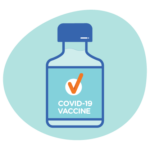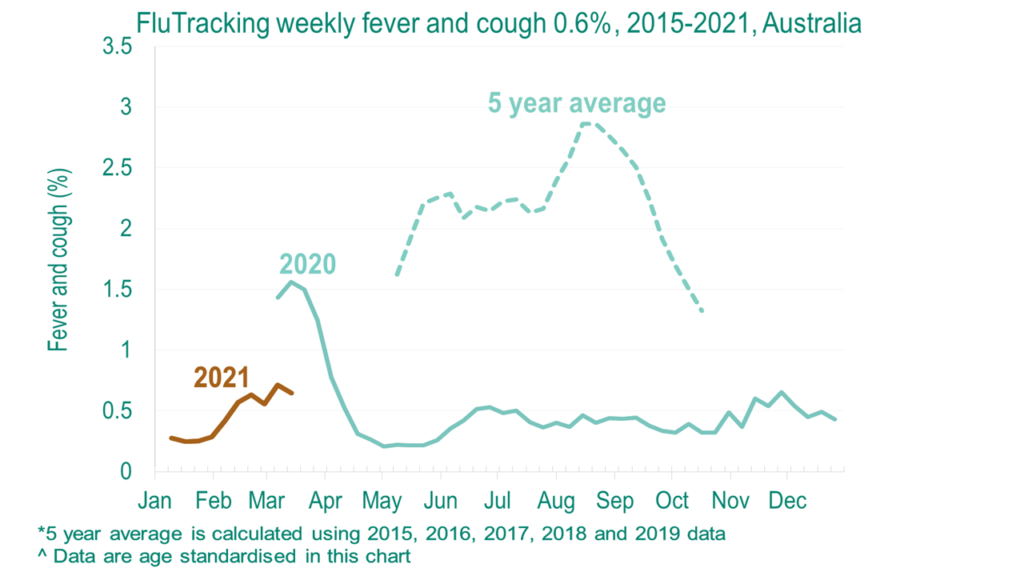Yes, this is another one of “those posts” where people talk about the vaccination they’ve just had. But hopefully it will provide a useful datapoint for others.
2021 COVID vaccine
 Yesterday I received my first dose of the AstraZeneca ChAdOx1-S COVID-19 vaccine. At this point I’ll be getting the booster dose around late June. In some countries they’ve been giving the booster after 4 weeks, but there is evidence that waiting 12 weeks results in better protection, so 3 months is the standard in Australia.
Yesterday I received my first dose of the AstraZeneca ChAdOx1-S COVID-19 vaccine. At this point I’ll be getting the booster dose around late June. In some countries they’ve been giving the booster after 4 weeks, but there is evidence that waiting 12 weeks results in better protection, so 3 months is the standard in Australia.
As someone with “underlying chronic conditions” I was part of phase 1b of the Australian Government’s COVID vaccine rollout. You can check your own eligibility (and if you’re “up next”, that site will direct you to where to make a booking).
The effect on my BG levels has been fairly unremarkable.
I drove to the clinic, and my BG was 5.7 mmol/L when I got the injection. After waiting around the clinic for the prescribed 15 minutes monitoring, it had hardly changed. I headed off to the supermarket and then back to the car. But by then my BG had dropped to 4.4! But not surprising at all.
That can be life with T1D, especially with the unannounced exercise of striding around the market and then running through the rain back to the car. But 4.4 is not quite hypo levels. After reaching 4.2 it soon came back up, and I headed home.
That’s been the general story in the 24 hours since. My BG hasn’t stayed perfectly flat, but then it never does. I keep eating food, doing physical activities (building a fence yesterday, housework, riding 17km to work today), etc. Any variation has seemed perfectly normal.
My BG did peak at 10.3 after dinner last night, but there was a lot of coconut rice in that meal, even before desert!
This morning while drying off after a shower I might have felt a slight ache as I lifted my arm and stretched the muscle that had received the injection, but hardly anything before or since.
On the whole I’d say I’ve had no noticeable reaction to the vaccine. That’s fairly normal for me with most vaccines in fact. The vaccination against typhoid is probably the one that gives me the strongest side-effects, with a sore arm and general flu-like symptoms for a few days. Some people have reported similar reactions to the AstraZeneca vaccine, but for me: not so much!
2021 influenza vaccine
This year’s fluvax is also becoming available. The NIP (National Immunisation Program) ones should hopefully be available in April. Anyone with diabetes is eligible for a free fluvax through NIP every year: talk to your GP about getting it. Of course, it doesn’t cost much ($15?) to pay for one anyway.
For years I’ve had a flu vaccination every year. Not surprising really, as I’m already vaccinated against most other things. Including some things not commonly found in Australia.
In fact sometimes I would have another fluvax injection as a booster just as we were entering summer. That’s not the southern hemisphere’s “flu season”, but as someone who would often be leading expeditions around the world in the company of people from everywhere, a little extra insurance never went astray.
I’m looking forward to the freedom of travelling like that again…
Do we need fluvax this year?
2020 had a record low incidence of influenza, as can be seen in this graph from the FluTracking project.
 It’s not surprising really. The lockdowns, physical distancing, mask-wearing, and sanitation awareness brought on by COVID seem to have also had a dramatic impact on influenza, from April when our first big lockdowns started. Hopefully this trend will continue for a while (as long as people don’t relax too much after COVID restrictions).
It’s not surprising really. The lockdowns, physical distancing, mask-wearing, and sanitation awareness brought on by COVID seem to have also had a dramatic impact on influenza, from April when our first big lockdowns started. Hopefully this trend will continue for a while (as long as people don’t relax too much after COVID restrictions).
But influenza hasn’t gone away. I’m hearing anecdotal evidence from people who have already had influenza in 2021. Serious and sometimes life-threatening infections lasting weeks. Actual influenza, not just “a bad cold”.
So I have an influenza vaccination scheduled for mid-April. It needs to be at least two weeks away from a COVID vaccination for everything to have a chance of working.
When to get it, and one shot or two?
I’m unlikely to be encountering many people from other hemispheres for a while, so that justification for a 2nd annual flu shot has shrunk for now. I didn’t get one in the 2nd half of 2020.
In fact if the influenza rates stay low (at least compared to previous years) then I have to consider if it would be sensible for me to delay the vaccination til later in the year.
I decided to have the 2021 shot as soon as I could. Not only am I increasing my own protection for now, but I’m also helping protect everyone else around me by not being a transmission vector if I did contract influenza. In other words, I’m doing my bit to make sure the incidence stays low.
I feel this may become especially relevant as our society begins to open up again, encountering larger groups of people and travelling around the country more.
We’ll see how the year goes. I can decide later in the year if I think a “fluvax booster” is sensible for 2021.
What about a COVID booster?
We simply don’t know yet how long the different COVID vaccinations will offer protection. But especially because it’s unlike some of the disease viruses that mutate very slowly, it seems unlikely that one vaccination (with booster) will last us forever. Not only can our immune systems “forget” how to deal with some things, the COVID variants keep evolving. Hopefully this should slow down when the COVID infection rates around the world decrease.
Luckily vaccine development is continuing too. We already have two different vaccines in use in Australia, with more in the pipeline (that may have different effectiveness against new virus variants). But in the meantime getting my AstraZeneca vaccination is increasing my own protection plus helping reduce the transmission vectors and help protect everyone else. It can’t eliminate the transmission, but by all reports it does improve the odds.
I guess we’ll see what vaccines are needed in 2022…
Stay safe out there everyone!

I had my Covid-19 AstraZeneca vaccination on Monday and felt a little light-headed so they checked my blood pressure which was initially low but recovered quickly back to normal while I was monitored in the surgery. My BSL which is usually well controlled was fine for 48 hours but has been persistently high on Wednesday and Thursday (today) despite my 670G pump’s best efforts and correction doses. I hadn’t considered the Covid Vax for my high BSL but will monitor my readings and visit my GP if needed. Otherwise I feel fine and am grateful for the opportunity to protect my family and myself from the virus.
Thanks David
Being a front line worker, I have the 1st Pfizer vaccine on Feb 24 and 2nd dose on March 17. I’ve been a T1D for 38 years on pump/loop.
Only side effects were a very sore arm which lasted a few days after my 1st jab.
Following the 2nd jab, felt a little lethargic on day one, and arm pain that lasted 2 days. Been fine since. No effect on BSL’s
I got the 1st AstraZeneca shot last Tuesday 30th March (1st day of Brissie lockdown)
I booked Online the previous night, filled out the paperwork online, so went straight in when I got there.
I hardly felt the the shot at all – nothing like the Flu vaccine!
No after-effect on my arm at all either!
It has not made any difference to my sugars at all, at least not anything that is noticeable!
I have been told that one is more likely to feel unwell after the 2nd dose, so time will tell on that one!
I suspect more people get noticeable reactions after the 2nd shot of Pfizer than of AstraZeneca. With the AZ vaccine it may be that most reactions after after the first jab.
Both Pfizer doses left my arm sore for 24 hours, but otherwise no adverse effects. I can’t say my BSLs were any different from normal (ie variable). Thanks for the article.